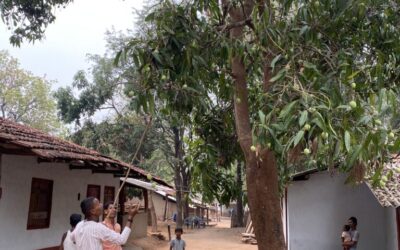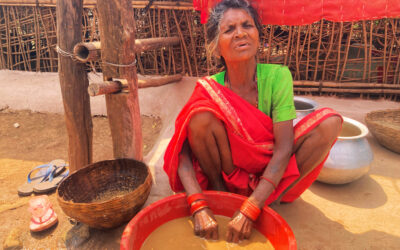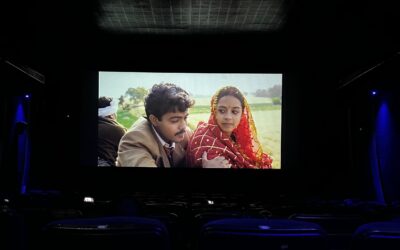Two months ago, I stepped into the serene, verdant, and far-flung land of Sagroli village. It lies in the easternmost corner of the Nanded district of Maharashtra. Sagroli proudly shares its border with the states of Telangana and Karnataka. At first, it seemed quite hard to reach here; but after changing two trains and catching a bus to Biloli – I was welcomed by the warmth of both the people and the sunlight.
The sun here is very generous. Except is generosity always good? Back then, I did not understand how generosity, at times, can have unintended consequences. Now, after immersing myself in the work of Sanskriti Samvardhan Mandal (SSM) across education, agriculture, natural resource management, and skill development, I have gathered perspectives that reveal the deeper layers of community living. Engaging with countless community members — from farmers and single mothers to students, employees, shopkeepers, and management, I have stories to tell beyond the idyllic, the beautiful, the charming, and the picturesque.

Upon approaching the campus, a small pond greets you just outside, often frequented by white cranes feeding on insects. Moving forward, the modern grey architecture of the district’s Krishi Vigyan Kendra (KVK), also managed by SSM, stands as a masterpiece. But what truly captures one’s attention are the three ducks – two white and one half brown – leisurely waddling in front of the water sprinklers installed by KVK.

As you stroll forward, you see that the campus is filled with large trees but there is one that stands out: a grand 59-years-old Banyan tree proudly displaying the inscription “वसुंधरा सभागृह.” It was planted at the organization’s inception and the locals see this tree as a symbol of growth, mirroring the organization’s progress. The Banyan tree and its surroundings are home to diverse creatures including dogs, monkeys, chimpanzees, frogs and birds. All the buildings of importance also lie around this Banyan tree.
Directly in front stands the “कर्मयोग” office, where most of the organization’s paper work takes place. To the left is Chattrapati Shivaji High School – the oldest among the five schools that are now a part of the campus. To the right, the “छोटा सरदार” boys’ hostel echoes with youthful energy and nestled behind the tree is “अनुसया,” the girls’ hostel. अनुसया is also the place where I have been given a small room that serves as my sanctuary within this vast campus.
My first few weeks here were spent learning the art of coexistence – coexistence not with people but with insects, monkeys, chimpanzees, and frogs. I remember being overly excited about having a place with young girls around me all the time. Soon the initial excitement turned into agitation as I realized I wasn’t the only inhabitant in the room. Instead, I had to share it with many other unpleasant-looking tenants. The grotesque insects who had been residing there for years.
The first night turned into a game of hide and seek, with me attempting to evade them and them managing to catch me regardless. It turned into a playful back-and-forth, each of us catching the other off guard. However, as the days passed, we made peace with each other. We have our own spaces now and they have generously provided me with spaces where they hardly enter. Everything changed when I realized that I was the invader here, not them, for their tiny homes inside my room were age-old.

With monkeys though, I continue to have an ongoing feud, and I have not found time to come to a settlement. The settlement is indifference for now. We do not see eye to eye with each other. As much as I believe in forgiving, they have taken a lot from me already and it is getting hard for me to continue forgiving them. During my second week here, they took away the most important piece of my clothing- my lingerie. It took a while for me to understand what was going on. I observed their timings, their power moves, and then one fine day I caught them red-handedly taking away my T-shirt. That was the day I decided I was not going to let this happen again.
I started to hang my clothes in a space that was inconvenient for them to reach. It did work for many days but one evening when I was returning from work, Payal (a 14-year-old co-resident of Hostel), informed me that the monkeys successfully took away my purple joggers. She told me that she attempted to shoo them away but they managed to frighten her. Naturally so; for they are a team of tens and my girls are a team of fours. It was turning into an unfair clash. That is when I concluded that indifference is the only option left for me. I was not going to let these monkeys make my girls feel weak.

Besides the animals and insects, I did meet hundreds of wonderful human beings. It became a ritual to give my introduction at least once a day which continues till date. The days when I do not have to introduce myself feel incomplete now. Alas, with the introduction of human beings in my life began my journey of understanding the complex social relationships on which a community exists.
During my first month, I barely had time with myself, I would go wandering from one person to another. I got to talk to many people at length- hostel wardens, mess employees, the women working at a micro food processing unit, farmers, teachers, colleagues, students, and athletes. After every interaction, I felt so moved that I wanted more people to hear their voices. Hence, I made sure to make a mental note of writing their stories one day. What I never considered was: Do they want to tell their stories to the world?

With the second month started my journey of realizations. It came with many surprises. The biggest one being – none of the stories that I thought I knew were complete. All I knew was a single story. After talking to people with different stakes in the community, I realized that everyone has a different story to tell and maybe none of them want to tell me the real story yet. This made me question my position in the community.
I came here as an outsider, who looked and spoke differently. Every time I told someone my full name, I was already placed in a position of perceived power, owing to my caste. My closeness with the director, sector heads, and important members of the community, at times, might have created fear instead of trust. Hence, instead of narrating an incomplete verse, I thought of gradually building trust.
As a society, we struggle to embrace our vulnerabilities and failures; there is a prevailing reluctance to talk about what went wrong. Instead, the focus tends to be on showcasing successes and maintaining a façade of constant triumph. Being a woman and having to prove that she is good enough to be a part of the community adds another layer of complexity to openly talk about her struggles, her turmoil, and who she truly is. Such was the single story I was hearing about domestic violence survivors.
Everyone else than them talked about it due to the stigma attached to it. Let alone, take a divorce, or completely leave their abusive husbands. After all, who wants to appear weak within a community? Maybe seeing me embrace my vulnerabilities would make them open up about theirs. And I learned to ask, can I tell your story? If I lend my ear to someone for half an hour, it surely doesn’t become my lived experience. It is the person who has the power. It is the person who needs to feel powerful in doing so and if they don’t: it is counterintuitive.
The only truth that I now abide by in a community is that every day is different. Every single day, you are in for a new adventure. Maybe there will be a power cut for twelve hours or you might find yourself locked inside a washroom. Maybe you will see the most beautiful peacock ever or you will go for a dip in the swimming pool. Perhaps, someone will come to you to tell their stories someday. Until then, I find joy in the small interruptions. The buzzing of insects, the leaps of frogs, the knocks at my door, and the calls for dinner—as I capture these moments in writing.





0 Comments